The Corporate Origins of Common Good Constitutionalism
A seemingly anti-corporate and conservative fad is built, and sustained by, corporations
Samantha Perri
January 25, 2023
In 1982, a group of conservative students at elite law schools invited some of the world’s most right-leaning scholars, judges, and Department of Justice officials to a symposium at Yale Law School. The event, called “A Symposium on Federalism: Legal and Political Ramifications,” intended to boost fringe legal theories: originalism and textualism. Originalism demands that judges interpret the Constitution as it was understood at the nation’s inception. Textualism insists that a legal text be interpreted according to its “plain meaning.” The Federalist Society – a conservative corporation backed by think-tanks and billionaires – was thereafter born. It now boasts 60,000 members, 6 of whom are on the Supreme Court, and promotes originalism and textualism. Now, after having achieved that initial goal, ultra-conservative students and scholars are pushing a new theory to control society: common good constitutionalism.
Common good constitutionalism is built with certain Catholic and conservative ambitions in mind, like anti-abortion policies, promoting heteronormative families, and creating laws on morality. In practice, common good constitutionalism would deprive people of fundamental individual liberties – like bodily autonomy – and support something like a dictatorship based on Catholic moral principles. Read a line from the manifesto on common good constitutionalism: “[T]he state will enjoy authority to curb the social and economic pretensions of the urban-gentry liberals who so often place their own satisfactions (financial and sexual) and the good of their class or social milieu above the common good.” While common good constitutionalism is secretly backed by corporate money, it publicly claims to be anti-corporate. In this piece we’ll explore who is making these claims about common good constitutionalism, whose money is at stake in the project, why this mismatch exists, and why it matters.
In practice, common good constitutionalism would deprive people of fundamental individual liberties – like bodily autonomy – and support something like a dictatorship based on Catholic moral principles.
Common good constitutionalism made its public debut in an Atlantic article written by Harvard Law Professor Adrian Vermuele. Published in March 2020 and entitled “Beyond Originalism,” Vermuele’s article serves as a manifesto on common-good constitutionalism. The manifesto goes something like this: Originalism is the dominant theory in the conservative legal movement; But the movement must adopt another theory so that rulers can establish the “common good.” Vermuele went on to write a book called Common Good Constitutionalism, published in February 2022, to supplement the manifesto.
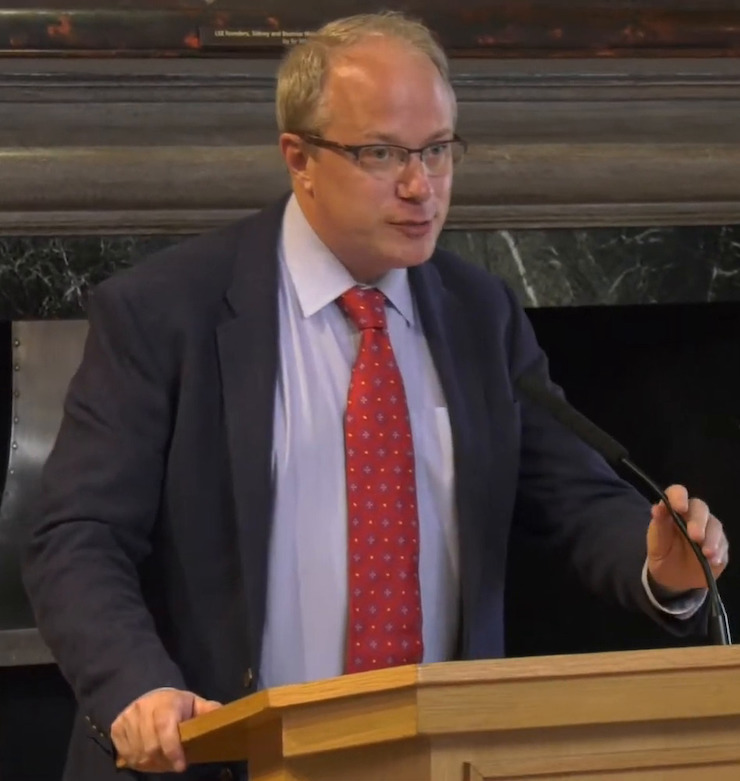
Photo taken by LSE Law.
Common good constitutionalism is a way to interpret law. Vermuele insists that the theory draws upon positive law – which he defines as “a legitimate specification by the public authority of general principles of legal morality that need concrete embodiment” – “general law common to all civilized legal systems,” and “principles of objective natural morality” to push law towards the common good. In layman’s terms, Vermuele argues that the theory pulls together law as the application of a general moral principle to a specific issue; law as a fundamental notion that all “civilized” people agree upon; and uncontested moral norms. That’s some punchy stuff!
But what is the common good? The Stanford Encyclopedia of Philosophy defines it in accordance with “ordinary political discourse” as what is provided to community members to care for certain common interests. Examples of such provisions include public parks, public transportation, civil liberties, clean air, and clean water. Catholic tradition identifies the common good as “the sum of total social conditions which allow people, either as groups or as individuals, to reach their fulfillment more fully and more easily.” Such conditions involve three elements: respect for the individual, the social well-being and development of the group, and peace. In practice, the Catholic common good requires authorities to ensure that people can access food, clothing, health, work, education, the right to establish a family, and more. William Galston of the Brookings Institute has centered his definition of the common good around community understandings. In the United States, Galston argues, the common good is outlined in the preamble to the Constitution: a more perfect union, justice, common defense, domestic peace, the general welfare, and liberty. The endless list of definitions of the common good center around the same idea – serving the community – but materialize in different realities.
Vermuele argues that the common good reflects peace, justice, abundance, health, safety, economic security, solidarity, and subsidiarity. He claims that his view is based upon classical law and the European tradition of ragion di stato.
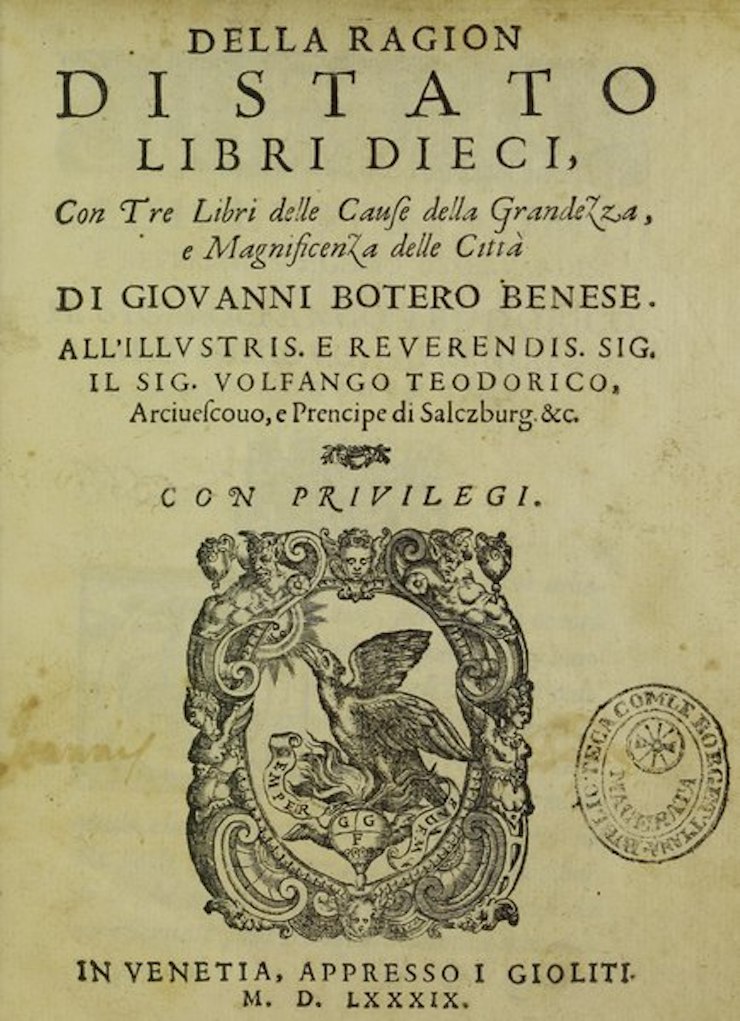
Photo of Della Ragion Di Stato by Giovanni Botero.
Ragion di stato, popularized by Giovanni Botero’s late 16th century book Della Ragion di Stato, proposes a Catholic government that is second only to God. On one page, the book reads: “[T]here is nothing that dispenses a subject from obedience owed to the prince unless it is against the law or nature of God.” It adds elsewhere: “[T]he prince ought to humble himself with his whole heart before the Divine Majesty and acknowledge that the kingdom and the obedience of his subjects come from him . . . [and he should not] undertake any campaign or anything else which he is not certain to be conformed to the law of God.” Vermuele’s perception of what is in the common interest revolves around a 16th century Catholic view of law as the specification of God’s will.
In reaching the common good, Vermuele senses that certain permanent principles must be upheld. These principles are: “respect for the authority of rule and rulers; respect for the hierarchies needed for society to function; solidarity within and among families, social groups, and workers unions, trade associations, and professions; appropriate subsidiarity, or respect for the legitimate roles of public bodies and associations at all levels of government and society; and a candid willingness to ‘legislate morality’ . . . .” Removing the complicated language, Vermuele insists that people obey rulers, accept hierarchies, keep heteronormative families, and abide by laws on morality.
Vermuele’s perception of what is in the common interest revolves around a 16th century Catholic view of law as the specification of God’s will.
While common good constitutionalism would grant large power to an executive agent to determine what is in the common good, Vermuele recognizes that there are limits to this power. If an executive (a) acts outside its sphere of legal competence, (b) pursues goals “that have no imaginable public purpose,” or (c) acts “in an unreasoned manner, arbitrarily and capriciously,” then the presumption that the agent is acting legally in the common interest runs out.
While Vermuele presents his ideas about the common good as objective to the Atlantic audience, he admits to the readers of his book that it is impossible to give law meaning without using conceptions “inevitably . . . laden with normative assumptions.” Vermuele notes that, when justifying law, people craft arguments on grounds of political morality. In his book, he admits that common good constitutionalism is “fundamentally ‘conservative.’” First presented as neutral and impartial for a more public audience, common good constitutionalism is later described as right-leaning to an audience interested enough in the theory to read Vermuele’s 270-page book.
Vermeule’s goals for the theory were eventually laid out in plain English. In the abstract, he argues that progressive accounts of human flourishing – liberating people from tradition, family, religion, economic circumstances, and biology – “is a wildly implausible account.” He contends that promoting individual autonomy is “antithetical to the idea of a genuinely common good.” When considering how common good constitutionalism would change society, he says that the Supreme Court’s philosophy (in 2020) with regard to free speech, abortion, sexual liberties, and “related matters” would “prove vulnerable.” The idea that each person would be able to define their own concept “of existence, of meaning, of the universe, and of the mystery of human life” (as outlined in the 1992 Planned Parenthood v. Casey Supreme Court decision) would be “not only rejected but stamped as abominable, beyond the realm of acceptable forever after.” The government would judge both the quality and “moral worth” of public speech. Vermuele justifies this position by referring to tradition: expressive freedom was limited to the common good. Vermuele even describes how he believes that Obergefell was wrongly decided because marriage is an institution centered on a relationship between a man and woman, oriented toward the common good through reproduction. Quite contrary to his own statements about the effects of common good constitutionalism, Vermuele tells readers that “the common good is not ‘preferences’ or ‘what I like’ or ‘whatever the ruler imposes at whim.’”
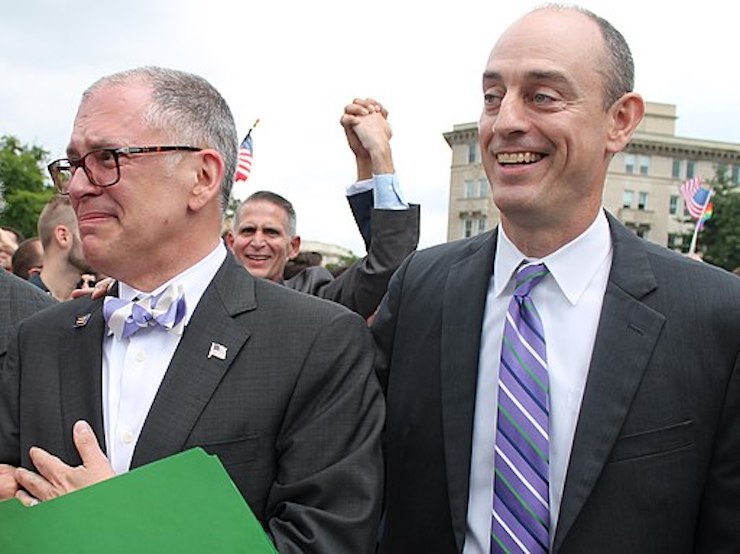
Photo taken by Elvert Barnes found at Wikimedia Commons
Surely, the “theory is objective” bit goes, the common good does not “prescribe any particular legal institutions or rules.” The natural law, Vermuele writes, provides broad discretion for authorities. Yet, he admits that there are certain institutional arrangements that are off-limits. In particular, arrangements that he describes as “mostly science-fictional and horrific” and “strictly aggregative-utilitarian” are prohibited due to “the nature of law itself, as an ordination of reason to the common good.” This rings ragion di stato bells. What exactly these off-limits arrangements look like is unclear because Vermuele does not explain them in his manifesto or book. However, the latter might involve institutions that promote individual liberties as a means of aggregating total welfare.
Even if legal subjects do not think the ruler is acting in their best interest or is being coercive, Vermuele argues that subjects will probably change their mind as the law teaches them, “habituates” them, and “re-forms” them.
Vermuele tries to justify his harsh framework and reassure those hesitant about the theory’s likelihood of success by characterizing law – and rulers – as a wise, all-knowing teacher and parent. Even if legal subjects do not think the ruler is acting in their best interest or is being coercive, Vermuele argues that subjects will probably change their mind as the law teaches them, “habituates” them, and “re-forms” them.
![]()
Common good constitutionalism seems to be an anti-corporate project. In his manifesto, Vermuele references corporate structure and power in negative terms. He argues that structures of corporate power facilitate pandemics, natural disasters, and climate change – and insists that a state should protect the vulnerable from those consequences. He holds that a state should be empowered to protect its people from “corporate exploitation and destruction of the natural environment,” “the vagaries and injustices of market forces,” and exploitative employers.
Anti-corporate sentiments are sprinkled throughout Vermuele’s book as well. He notes that corporations can abuse their economic power by wielding common-law rights of property, torts, and contracts in costly litigation and lobbying. He insists that society has learned that the marketplace of ideas is “radically imperfect.” Surely, corporations “can and frequently do abuse” their power.
But Vermuele is particular and intentional: he is only anti-corporate power when it facilitates outcomes that do not support his views, or directly fund his ideas into conversation.
But Vermuele is particular and intentional: he is only anti-corporate power when it facilitates outcomes that do not support his views, or directly fund his ideas into conversation. Indeed, in the last chapter of his book, Vermuele quotes Johannes Messner (a Catholic theologian) to discuss how federative and corporative branches of society, with “a plurality of free associations based on economic group interests,” can safely be provided subsidiary power by the state. Later, he writes: “Subsidiary political jurisdictions, like subsidiary corporations of all types, have legitimate roles in an overall scheme for the promotion of the common good, and in that sense they are owed a duty of justice by the highest public authority not to be unnecessarily disrupted in the performance of those roles.” Note that the idea of subsidiarity is Catholic in origin. So, if a company provides a good that tends to support society but, in the process contributes to climate change, should it be “disrupted?” Vermuele insists that the authority should only step in in “exceptional circumstances.” It is curious that Vermuele’s concerns about corporate power fade once he gets into the details of his ideal government. But maybe it is not so curious, because common good constitutionalism might not even exist but for corporate power, money, and support.
![]()
The theory gained prominent attention thanks to the platform that The Atlantic, an outwardly liberal magazine, provided it. The Atlantic is owned by The Emerson Collective, also known as the Waverly Street Foundation, a limited liability corporation (LLC). The Collective is retained by the Emerson Collective Foundation, a 501(c)(3) nonprofit foundation. Laurene Powell Jobs, The Emerson Collective’s founder, had big ambitions for her nonprofit endeavors. Powell Jobs’s vision took off when she inherited $20 billion from her late husband, Steve Jobs.
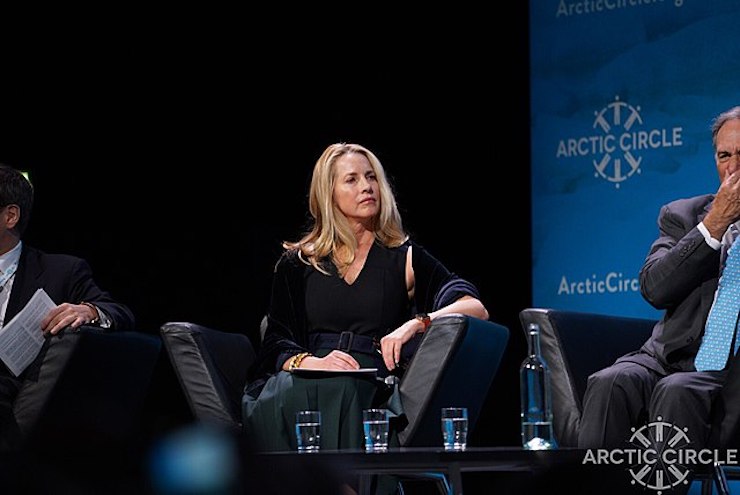
Photo by Arctic Circle found at Wikimedia Commons.
The Emerson Collective has become “perhaps the most influential product of Silicon Valley that you’ve never heard of.” Indeed Powell Jobs has preferred to stay out of the spotlight. All the while, the Emerson Collective has invested in private companies, backed advocacy groups, supported Democratic candidates, and financed a super PAC.
The Emerson Collective claims to use billions of dollars to pursue “a more equal and just America.” It aims to influence immigration reform, build a resilient climate future, find breakthrough treatments for cancer patients, increase access to quality education, reduce gun violence in Chicago, tackle race and equity issues in the south, and cultivate “high quality” journalism and storytelling.
And while Powell Jobs invests her money into The Atlantic and other journalistic ventures, she has maintained the facade that her investments are separate from their outcomes. She has steered clear of The Atlantic’s editorial process and products, insisting that her money is distinct from the magazine’s work. It is curious that Powell Jobs funds a magazine publishing about a theory centered around social hierarchies and blatant inequality, both of which are against her and her LLC’s stated values. Surely Powell Jobs wouldn’t finance a magazine denouncing immigration reform. If it were not for The Atlantic’s around 500,000 annual viewers combined with The Emerson Collective and The Emerson Collective Foundation’s money, perhaps common good constitutionalism would not have acquired such widespread consideration – at least that is what Josh Hammer, opinion editor at Newsweek and Federalist Society contributor, said at the Common Good Constitutionalism Symposium co-hosted by the Harvard chapter of The Federalist Society and the Harvard Journal of Law and Public Policy in October 2022.
![]()
Common good constitutionalism has spread to audiences beyond The Atlantic through Vermuele’s book, which he published with Polity. The publisher describes itself as “the home of independent thinking.” It publishes coursebooks, textbooks, and books “with a critical edge that stimulate public debate about key issues in social, political and cultural life.” Polity is a subsidiary of John Wiley & Sons, Incorporated.
While little information is readily available on Polity, its parent company has a lot to say about its role as a publicly traded company in society. Wiley describes its corporate responsibility as follows: “Helping to solve social, economic, and environmental challenges . . . locally, and globally.” It declares its intolerance for discrimination against LGBTQI+ people. It claims that its culture is unique, and that its core values allow its employees to help unlock human potential, the corporation’s mission. But Wiley’s support of common good constitutionalism shows that the corporation’s stated goals do not line up with its work. By publishing a book that advocates for limiting the rights of LGBTQI+ people, among others, the corporation shows what it truly values: a profit.
Since the book and manifesto were published, common good constitutionalism has relied on support provided by The Federalist Society and its related entities to further its development. Over the last three years, Federalist Society chapters in at least nineteen states have hosted events centered around common good constitutionalism. These events encourage more thought and conversation about the theory’s potential issues and promises.
The Common Good Constitutionalism Symposium was one such Federalist Society event. The Symposium provided space for conservatives to come together, nitpick common good constitutionalism, and leave with an understanding of where to go with it. The event consisted of back-to-back components: four panels, a keynote speech by Harvard Law professor Stephen Sachs, and a response by Vermuele. The components were bookended by opening and closing remarks. Participants wrote articles on the theory to be published in the Harvard Journal of Law & Public Policy – an academic journal to which every member of The Federalist Society is subscribed. More on the Journal later.
![]()
The Common Good Constitutionalism Symposium resembled the symposium hosted at Yale forty years prior, from which the Federalist Society sprout. The world’s most right-leaning students, scholars, professors, media correspondents, and judges were invited to attend. The Symposium’s goal was to expand upon a fringe theory. And the Symposium provided space to build a more cohesive and informed community for the conservative legal movement.
The Symposium was framed as a serious debate, much like other Federalist Society events. In reality, it symbolized a marriage of originalism and common good constitutionalism. In the Symposium’s first panel, “CGC and the Judicial Experience,” Judge James Ho asked his comrades to let originalism and common good constitutionalism be in “friendly competition” with one another. He claimed to be an originalist, and then noted that common good constitutionalism could aid originalism. The initially stark contrast between the two theories was muddied by Ho.
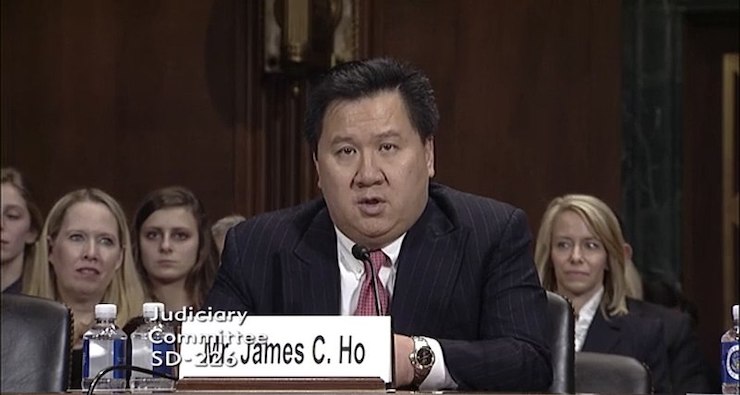
Photo by U.S. Senate Judiciary Committee
What seemed to be a divide between originalism and common good constitutionalism nearly dissipated throughout the rest of the event. Hammer remarked that common good constitutionalism and originalism have “come closer together.” He claimed that the United States Constitution was based on “primary truths,” which are oriented towards the common good. In this sense, common good constitutionalism appears to be another version of originalism that is more honest about its intentions. Ilan Wurman, associate professor of law at Arizona State University, argued that there is “plenty of room” for common good in originalism.
The conversations at the Symposium were more focused on ideas in the abstract than consequences of the theory in reality. Linda McClain, professor of law at Boston University, called out this issue. Reiterating comments that she provided at a conference on common good constitutionalism months prior, McClain questioned how common good constitutionalism would deal with status hierarchies if it was inspired by a classical legal tradition that is both sexist and racist. She wondered whether any hierarchies could be legitimate. She argued that common good constitutionalism seemed to be a government for the people, not a government by the people for the people. Vermuele responded directly to McClain – indeed she was one of the only people he directly responded to at the Symposium – and characterized her qualms as results of a careless review of his book. He urged her to go back and read the book. He did not address any of her concerns.
McClain was not the only person to call out the theory’s ambiguity at the event. Lee Strang, John W. Stoepler Professor of Law & Values at the University of Toledo and convener of the Symposium, argued that common good constitutionalism is unclear in how it serves the common good. If it were to adopt a distinctive approach to the common good, which prioritizes community flourishing, Strang worried that many would find it “wicked.” Cass Sunstein, the Robert Walmsley University Professor at Harvard, feared a form of common good constitutionalism that “would be abhorrent” but would use the words common good constitutionalism. It is plausible that Sunstein was thinking about Hitler’s 25-point Nazi Party Platform, which demanded that common good (or interest, depending on your translation), be prioritized over self-interest.
At the end of the Symposium, it seemed that common good constitutionalism was the next big thing – even though there were some real concerns. During his closing remarks, Vermuele encouraged his peers to figure out how to make common good constitutionalism work in different areas. “I do protest mildly,” he said, “that it is unreasonable for scholars in every given area to demand that I personally figure out what I think about the areas or cases of greatest interest to them; [my work] is meant as an invitation for others to work these things out in a broad range of areas, many well beyond my ken.”
Tracking other Federalist Society events, the Symposium was made possible by an anonymous donor. While John M. Olin provided the initial financial support for The Federalist Society, it’s hard to say now who exactly is providing the money to keep the machine running without looking deep.
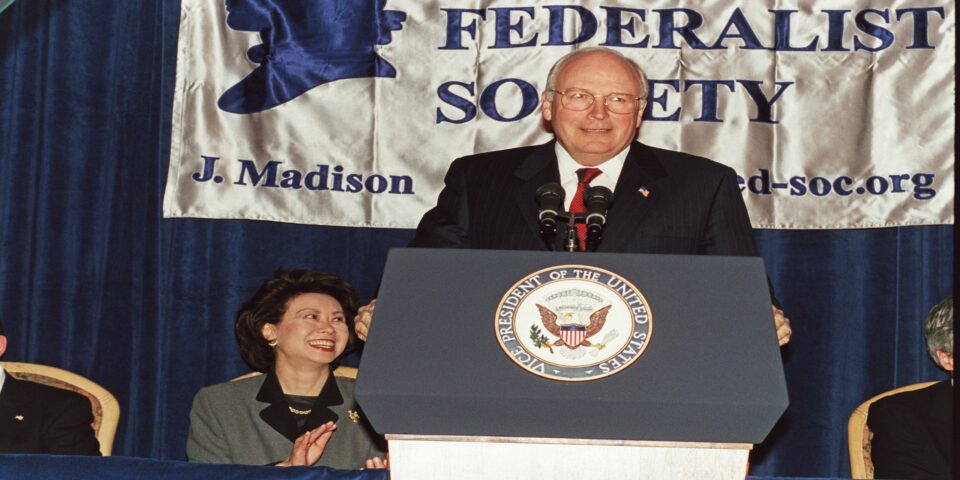
Photo by Shawn T. Moore, found on National Archives Catalog
The Federalist Society claims that ninety percent of its funding comes from individuals, while ten percent comes from corporations. The Society made over $1.5 million from registration fees and membership dues combined in 2019. It accrued another $16.7 million in gifts, grants, and contributions that year. Annual membership rates for The Federalist Society are as follows: $50 for a lawyer and general member; $25 for faculty, the public sector, and non-profits; and $5 for a student. Registration fees for typical events appear to range from $5 for Federalist Society members to $15 for non-members. For conferences, registration fees range from $25 for Federalist Society members to $75 for non-member participants seeking to receive CLE credit. CLE stands for continuing legal education. Across the country, lawyers are required to continue receiving some level of legal education even after their formal education ends. That people may receive CLE credits for attending a Federalist Society event speaks to how the legal system at-large is captured by The Federalist Society, or at the very least supports and condones its existence.
The framing of the Common Good Constitutionalism Symposium (among other events that The Federalist Society supports) as a “debate” helps to cleanse that money of the perception that it is directly contributing to the outgrowth of authoritarian ideas, among other horrors.
The Federalist Society does a good job of hiding where its money comes from, but it’s safe to say that it comes from other people and corporations who share its contributors’ narrow worldview. The framing of the Common Good Constitutionalism Symposium (among other events that The Federalist Society supports) as a “debate” helps to cleanse that money of the perception that it is directly contributing to the outgrowth of authoritarian ideas, among other horrors. To be sure, some of the corporation’s events are much clearer about their intent to deprive people of their bodily rights; boost incarceration of minority low-income communities, which are most likely to be locked up; uplift big business to the detriment of people’s livelihood; and maintain a status quo that benefits white people to the detriment of people of color.
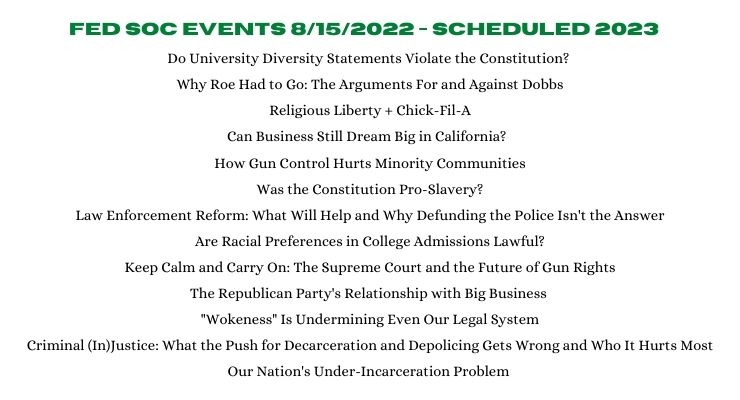
Graphic created on Canva by Samantha Perri
But The Federalist Society’s support of common good constitutionalism does not end with events. As noted above, all members of The Federalist Society receive a subscription to The Harvard Journal of Law & Public Policy. Since Vermuele’s manifesto was published, the Journal has published two essays on common good constitutionalism: one by Vermuele and Conor Casey called “Myths of Common Good Constitutionalism,” and another by Josh Hammer entitled “Common Good Originalism: Our Tradition and Our Path Forward.”
While the Harvard Journal of Law & Public Policy sounds like a dissemination on laws created by the legislature and executive, it’s really a place for conservative scholars to publish their ideas through a corporation connected with Harvard’s prestige. The Journal proudly calls itself “one of the most widely circulated law reviews and the nation’s leading forum for conservative and libertarian legal scholarship.” It does not mention that The Federalist Society provides its tens of thousands of members a copy of its issues. To make things more complicated, the Journal is published by the Harvard Society for Law & Public Policy, Incorporated. A search for details on the corporation gets you nowhere. The corporation running the Journal seems to be just as good as covering its tracks as its related entity, The Federalist Society.
It remains to be seen how much more The Federalist Society will do to bolster common good constitutionalism, and how many more articles its front of a journal and related corporation will publish on the theory.
![]()
Other corporations have sponsored Vermuele’s lectures on originalism and textualism since his launch of common good constitutionalism. They have provided Vermuele legitimacy and a platform to comment on the legal system and advocate for theories like common good constitutionalism.
An obvious source of legitimacy for Vermuele has been the Harvard Corporation. Harvard has provided him the resources to develop his point of view as a college and law student and continues to foster his intellectual path as a professor. Harvard’s endowment has been linked to community displacement, slaveholders, the prison-industrial complex, the fossil fuel industry, apartheid in South Africa, and the tobacco industry, which leaves one wondering what other social and systemic injustices Harvard has a hand in sustaining.
While Harvard did not outwardly support the Common Good Constitutionalism Symposium or the theory writ large, I did not see anyone remove the sign at the venue directing attendees to the Symposium, which read “Harvard Law Meeting.” If a fringe legal theory like common good constitutionalism were to become popular, maybe Harvard would want to be connected to the fad. There are countless examples of Harvard holding on high people who have amassed a wealth of power after they were once seen as going against the grain. For example, when Barack Obama ran for re-election in 2012, the Harvard Law Bulletin posted an article emphasizing that Obama had attended the law school. But back in 1990, when Obama attended the law school, he was an ally to the crits challenging the status quo – which Harvard tried to shut down.
While Harvard did not outwardly support the Common Good Constitutionalism Symposium or the theory writ large, I did not see anyone remove the sign at the venue directing attendees to the Symposium, which read “Harvard Law Meeting.”
The Harvard Corporation’s actions speak louder than its silence. In the spring of 2023, the law school will be putting on a reading group entitled “An Introduction to the Classical Legal Tradition” taught by none other than Adrian Vermuele. In addition, he will be co-teaching a seminar with Cass Sunstein called “Advanced Issues in Administrative Law and History” and teaching, on his own, Administrative Law. It seems Vermuele is taking the advice Ho gave him at the Symposium – if you want to launch a new school, it must begin in the academy with teachings related to natural law and Blackstone (a jurist known for his writing on the legal personhood of corporations) – and is starting to work the bases of his theory into the courses he teaches.
The Herbert W. Vaughan Academic Program has also been a proud supporter of Vermuele. In October 2022, the Program put on Vermuele’s lecture entitled “The Original Scalia” at Harvard Law School, moderated by Harvard Law professor Jack Goldsmith with comments from Harvard Law professor Lawrence Lessig and Judge James Oldham of the Fifth Circuit Court of Appeals. In the lecture, Vermuele discussed how Antonin Scalia’s ideology shifted over the course of his career, veering away from originalism. This lecture felt like it foreshadowed Vermuele’s remarks at the Common Good Constitutionalism Symposium about how originalists were losing sight of their initial goals and about how common good constitutionalism could bring to light principles that the founders envisioned.
The Program backed its first lecture at Harvard Law School in 2008, and since then has sponsored a lecture every other year. Its first lecture was given by Scalia. In the years that there is no lecture, the Program supports Federalist Society events. The Program aims to “promote and advance understanding of the founding principles and core doctrines of American constitutionalism.” Such principles and doctrines were necessarily supported by corporate power; The earliest colonies were based on corporate charters.
Vaughan, the Program’s namesake, dedicated his life to protecting corporations from regulation. He worked at (what is now) WilmerHale for forty-seven years and, during that time, was the point-person for developers and lenders. He started off as co-counsel on the Prudential Center and pushed the Massachusetts Legislature not to impose local real estate taxes on the project. He chaired the firm’s Real Estate Department and Executive Committee, was the firm’s co-managing partner for four years, and the firm credits its success to Vaughan’s legacy. After retiring, Vaughan continued to consult the firm’s clients with regard to title matters. The money that Vaughan made to prop up the free market has funneled directly into the hands of Vermuele, common good constitutionalism, The Federalist Society, and Harvard Law School – the welcome host of events in his namesake.
The money that Vaughan made to prop up the free market has funneled directly into the hands of Vermuele, common good constitutionalism, The Federalist Society, and Harvard Law School – the welcome host of events in his namesake.
Let us not forget a major corporate power that has significantly contributed to Vermuele’s success and thought: the Catholic Church. Vermeule converted to the Church only recently, having been influenced by folks at Notre Dame, Harvard, and “behind and above all those who helped [him] along the way, there stood a great Lady.” Catholic thought, Vermuele admits, has provided the basis for his worldview, which has culminated in common good constitutionalism. The Church, more generally, has provided a community for him to test out his ideas – read a talk he gave to Catholic students and young professionals – and an audience that pushes his points more towards Catholic teachings – see this article, insisting that Vermuele’s work is dangerous and flawed because it is not “Catholic enough.” It has provided him supports despite hard-hitting criticisms – see this article, demanding that people take Vermuele “seriously.” The Church has provided him a foundation on which he can argue that his homophobic, hierarchy-driven, authoritarian theory is rooted in a long-standing tradition which, for that reason alone, renders it worthy of consideration.
![]()
Though it would be tempting to dive deeply into all the moneymakers supporting common good constitutionalism, it’s safe to say that the theory has obtained and maintained its recognition due to corporate law, power, and its dirty money. So why has common good constitutionalism adopted such an outward-facing anti-corporate framework? And why has it denounced corporate exploitation and market forces, when free markets and free corporate power has been integral to the money funding its success?
Maybe Vermuele realized that, if he wanted people to take common good constitutionalism seriously, the theory would have to, at least, recognize the public’s baseline perspectives with regard to corporate law, money, and power. In 2022, forty percent of people polled by Gallup said that they have very little confidence in big business. This is nothing new. Throughout Gallup’s polling history, going back to 2001, people have been increasingly dissatisfied with corporate size and influence.
Perhaps Vermuele realized that he had to make some concessions to reach audiences that do not share his background and affiliations. The battle for adherents now reaches beyond academia. The carefully designed conservative legal ideology needed to make some tweaks to appeal to the average person and recognize that corporate law and power is not without its faults.
Moreover, Vermuele’s blanket comments about how corporate law and power can go wrong do not offend the corporations backing his theory, nor provide reason for them to withdraw their funds. These corporations, too, are aware of public perspectives regarding their wealth and power. They, too, recognize that they are not immune from criticism. They, too, know that if they want to hang on to the influence that they have in society, they must make some concessions.
Common good constitutionalism is not just some abstract idea. The theory’s allegiance to antiquated Catholic morals, social hierarchy, homophobic policies, a classical legal tradition baked in sexism and racism, and an expansive executive with the power to demand certain conduct from its subjects may manifest materially in reality. Vermuele has recognized the power of legal theory to shape people and culture towards certain ends. He is aware that his theory is significant because it can be so much more than words on paper. And he is aware that the majority of the Supreme Court is conservative like himself. If only the 6 Federalist Society justices bought into common good constitutionalism, he must imagine, what outcomes might result? Perhaps an immigration law that prioritizes Catholic people. Perhaps a declaration that rights to bodily autonomy do not, and never will exist. Perhaps an executive order that operates like a quasi-dictatorship. Perhaps a world in which Adrian Vermuele, and his dirty-money-wielding friends, are at the top of the social order at the expense of others without the social, political, and economic capital to demand their individual rights are worthy, too. Perhaps a world in which corporate money and power continue to manipulate people and law to achieve social and systemic injustice might be within reach, thanks to common good constitutionalism.







